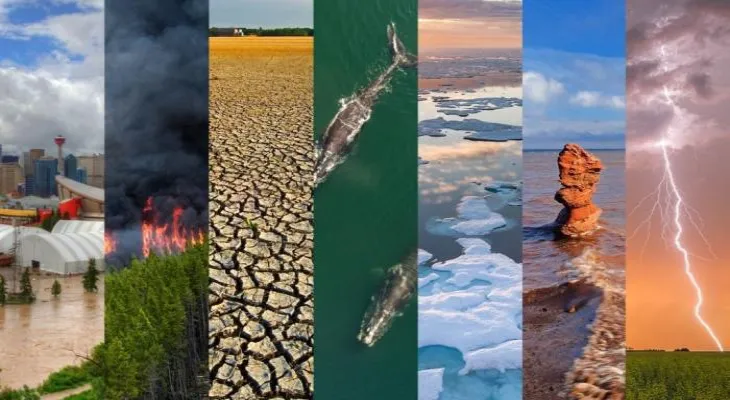Search here
Newspaper
Search here

Arab Canada News
News

Published: July 30, 2023
Canada has launched its first national climate adaptation strategy, aimed at reducing the risks of extreme weather events such as floods and wildfires.
It will also mitigate the impacts of global warming caused by fossil fuels, including permafrost thaw.
The strategy will be implemented over the next decade and is estimated to cost around CAD 15.4 billion (USD 11.69 billion) annually by 2030, as climate change and extreme weather affect life in Canada, which is already experiencing record climate events.
Wildfires, extreme heat waves, and floods have become more frequent, and permafrost thaw and rising sea levels are accelerating coastal erosion; in short, climate-related disasters are impacting the foundation of communities.
Thus, Canada launched its first national climate adaptation strategy, NAS, at the end of June 2023, after undergoing a consultative process. NAS offers a comprehensive community-wide approach to adapt to climate change, aimed at protecting Canadian communities and strengthening economies in the face of increasing climate-related disaster risks.
It aims to reduce the risks of extreme weather events such as floods and wildfires and alleviate the impacts of global warming caused by fossil fuels, including permafrost thaw.
The Canadian Climate Institute (CCI) estimates that climate impacts will slow Canada's economic growth by CAD 25 billion annually by 2025, equivalent to 50% of the expected GDP growth.
This strategy comes at a time when Canada is facing its worst wildfire season ever; fires have scorched about 7.8 million hectares before the hot summer months even began. The day before the announcement, the Canadian federal parliament building was shrouded in smoke from wildfires, a fitting representation of the urgent need across all levels of Canadian government to address and prepare for climate-related disasters.
The impacts of wildfires in Quebec across Canadian provinces also highlight the clear need for cooperative efforts to tackle the collective issue of climate change, integrating both short-term and long-term goals.
Recent climate disasters include Hurricane Fiona, which struck the Atlantic provinces, and a "atmospheric river" of rain that led to record flooding in British Columbia. Federal Environment Minister Steven Guilbeault stated, "The strategy aims to change the way governments, communities, and Canadians work together to prepare for and reduce climate change risks through coordinated and ambitious action."
The strategy's goals include improving health outcomes, protecting nature and biodiversity, and building more resilient infrastructure. In the coming months, the federal government will work with provinces and territories to implement key steps.
In addition to the final issuance of NAS, the Canadian government’s adaptation action plan was announced, with updates on adaptation investments since November 2022.
Already, CAD 164 million is being invested to improve flood mapping, and the government has allocated more than CAD 2 billion since fall 2022 for adaptation projects. Adaptation means creating safe and secure communities in this time of change, building strong and resilient communities means managing risks that threaten health, well-being, and livelihoods.
Ryan Ness, the adaptation director at the Canadian Climate Institute, stated, "The national adaptation strategy is a powerful tool to address the greatest climate risks facing the country. The federal government needs to act quickly to fund and implement it to shield Canadians from the increasing threats and costs of climate disasters."
The International Institute for Sustainable Development also welcomes the strategy's commitment to a five-year review cycle, with concrete goals and monitoring progress indicators, and reviewing the aim of securing sustainable, adequate, and equitable public funding to support adaptation efforts.
Additionally, Canadians must be prepared for the slow-onset impacts of climate change, such as rising winter temperatures and decreasing predictability of weather conditions, as immediately evident as the recent climate-related disasters like wildfires. Building climate resilience will require greater coordination across and among levels of government and local communities, as well as support for guiding adaptation governance processes.
Comments